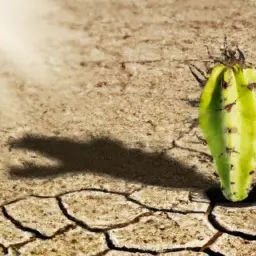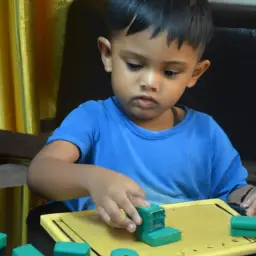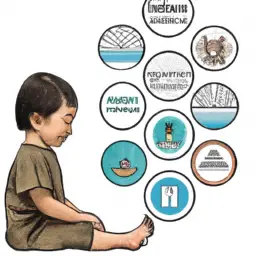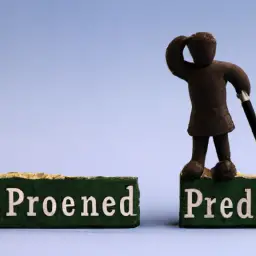Do you ever wonder why some people seem to persist through challenges while others give up easily? Or why some individuals have a high level of emotional intelligence and are able to manage their emotions effectively? The answer may lie in the concept of grit and emotional intelligence, two important traits that can greatly impact one’s personal and professional success.
Grit, defined as a combination of passion, perseverance, and resilience, has been the subject of much research in recent years. Studies have shown that individuals with high levels of grit are more likely to achieve their goals, whether in academics, athletics, or careers.
Emotional intelligence, on the other hand, refers to the ability to recognize, understand, and manage one’s own emotions as well as those of others. Those with high emotional intelligence tend to have better relationships, communication skills, and overall well-being.
In this article, we will delve into the science behind grit and emotional intelligence, exploring the latest research and how these traits can be applied in personal and professional settings.
Key Takeaways
- Grit and emotional intelligence are essential for personal and professional success.
- Both grit and emotional intelligence can be developed through mindfulness, seeking feedback, and setting goals.
- Developing grit and emotional intelligence leads to numerous benefits, such as better interpersonal relationships, improved communication, and increased success in both personal and professional settings.
- Grit is a better predictor of success than IQ or talent, while emotional intelligence plays a critical role in conflict resolution and effective relationship management.
Understanding Grit
You may have heard the term ‘grit’ thrown around, but do you fully understand what it means and how it can impact your success? Developing resilience and cultivating perseverance are two key components of grit.
Resilience is the ability to bounce back from setbacks, while perseverance is the ability to stick with a task or goal over the long term, even when faced with obstacles or challenges.
Research has shown that grit is a better predictor of success than IQ or talent. This is because individuals who possess grit are able to stay focused on their goals, work through challenges, and ultimately achieve success.
By developing resilience and cultivating perseverance, you can improve your own level of grit and increase your chances of achieving your goals.
Emotional Intelligence Explained
So, you wanna know all about emotional intelligence? Well, let’s start with the basics.
Emotional intelligence is made up of several components, including self-awareness, self-regulation, motivation, empathy, and social skills.
Developing emotional intelligence can lead to numerous benefits, such as better interpersonal relationships, improved communication, and increased success in both personal and professional settings.
If you’re interested in developing your emotional intelligence, there are several strategies you can use. These include practicing mindfulness, seeking feedback, and working on your communication skills.
The Components of Emotional Intelligence
Exploring the components of emotional intelligence reveals the intricate interplay between self-awareness, self-regulation, motivation, empathy, and social skills. Emotional regulation refers to the ability to manage one’s own emotions, thoughts, and behaviors in a productive manner. This involves recognizing and understanding one’s emotions, as well as being able to control or redirect them when necessary. Social awareness, on the other hand, involves being attuned to the emotions and needs of others. It includes being able to read social cues, empathize with others, and understand different perspectives.
To further understand the components of emotional intelligence, refer to the table below:
| Component | Definition |
|---|---|
| Self-awareness | Understanding one’s own emotions, strengths, weaknesses, and values |
| Self-regulation | Managing one’s own emotions and behaviors in a productive manner |
| Motivation | Being driven by internal factors, such as a sense of purpose or personal growth |
| Empathy | Understanding and sharing the emotions of others |
| Social skills | The ability to communicate effectively, build relationships, and work collaboratively |
By developing these components of emotional intelligence, individuals can improve their relationships, enhance their decision-making abilities, and increase their overall well-being. As you continue to explore the science behind grit and emotional intelligence, keep in mind the importance of cultivating these components in your own life.
The Benefits of Emotional Intelligence
Understanding the benefits of emotional intelligence can greatly improve your relationships, decision-making abilities, and overall well-being. By cultivating emotional intelligence, you can better understand the needs and emotions of others, which can lead to more harmonious relationships. This is because emotional intelligence is closely linked to empathy, which allows you to perceive and understand the emotions of others.
When you’re able to understand and empathize with others, you’re more likely to build stronger relationships with them. In addition, emotional intelligence plays a critical role in conflict resolution. When faced with a conflict, emotional intelligence allows you to remain calm and level-headed, even in the face of intense emotions.
This can help you to communicate more effectively, express your needs and concerns in a non-threatening way, and find mutually beneficial solutions to the conflict. By developing your emotional intelligence, you can become a more effective communicator and problem-solver, which can lead to greater success in all areas of your life.
How to Develop Emotional Intelligence
Developing emotional intelligence can be achieved by practicing self-awareness, active listening, and empathy towards others. Self-awareness is the ability to recognize and understand your own emotions, thoughts, and behaviors. It involves taking a step back and reflecting on how you react to situations and why. One way to develop self-awareness is by keeping a journal and writing down your thoughts and feelings. This can help you identify patterns in your behavior and emotions and allow you to make changes accordingly.
Building empathy towards others is another important aspect of developing emotional intelligence. Empathy is the ability to understand and share the feelings of others. One way to build empathy is by actively listening to others. This means giving your full attention to the person speaking and trying to understand their perspective. Another way to build empathy is by putting yourself in someone else’s shoes. Imagine how you would feel in their situation and try to understand their emotions. Developing self-awareness and building empathy can take time and effort, but with practice, you can improve your emotional intelligence and develop stronger relationships with others.
| Developing Self Awareness | Building Empathy |
|---|---|
| Keep a journal and write down your thoughts and feelings to identify patterns in your behavior and emotions. | Actively listen to others to understand their perspective. |
| Practice mindfulness and meditation to increase self-awareness. | Put yourself in someone else’s shoes and imagine how they feel in their situation. |
| Seek feedback from others to gain a better understanding of how you are perceived. | Show compassion and understanding towards others, even if you don’t agree with them. |
| Reflect on your past experiences and how they have shaped your emotions and behaviors. | Practice gratitude to appreciate the positive aspects of life and others. |
| Identify your strengths and weaknesses and work on improving them. | Be open-minded and willing to learn from others. |
The Connection Between Grit and Emotional Intelligence
The correlation between grit and emotional intelligence is undeniable. In fact, research shows that individuals who possess both traits are more likely to succeed in life. But what’s the connection between grit and emotional intelligence?
Here are three things to keep in mind when exploring the link between resilience and emotional intelligence:
-
Grit and empathy go hand in hand. Empathy, or the ability to understand and share the feelings of others, is a key component of emotional intelligence. Individuals who possess both grit and empathy are better equipped to handle challenges and connect with others.
-
Resilience is a key factor in both grit and emotional intelligence. Resilience allows individuals to bounce back from setbacks and keep moving forward. It also enables them to regulate their emotions in difficult situations, which is a crucial aspect of emotional intelligence.
-
Grit and emotional intelligence are both skills that can be developed over time. By practicing mindfulness, seeking feedback, and setting goals, individuals can improve their ability to persevere through challenges and connect with others on a deeper level.
The Latest Research on Grit and Emotional Intelligence
Now that you know about the connection between grit and emotional intelligence, let’s dive into the latest research on these topics.
Research has shown that grit and resilience are essential for achieving long-term goals and overcoming obstacles in life. Grit allows us to persevere through difficult times and bounce back from failures, while resilience helps us adapt to changes and recover from adversity.
Moreover, emotional regulation and well-being are closely linked to grit and emotional intelligence. Studies have found that individuals with higher levels of emotional intelligence are better equipped to manage stress and regulate their emotions. They’re also more likely to have better mental health outcomes and experience greater life satisfaction.
By developing grit and emotional intelligence, you can improve your ability to cope with challenges and enhance your well-being.
Applying Grit and Emotional Intelligence in Personal and Professional Settings
You know that grit and emotional intelligence are important in achieving success. In fact, they’re essential components for reaching your goals and overcoming challenges.
But have you ever thought about how you can apply these skills in your personal and professional life?
In this discussion, we’ll explore the practical applications of grit and emotional intelligence, as well as areas where further research and exploration are needed.
The Importance of Grit and Emotional Intelligence in Achieving Success
Imagine achieving success by having the grit and emotional intelligence to persevere through challenges and setbacks. The importance of resilience and emotional intelligence in career success cannot be overstated. In today’s fast-paced world, where change is constant, it’s essential to have the ability to adapt and overcome obstacles. Developing grit and emotional intelligence in youth is crucial for their future success. It’s a skill set that can be learned and honed, leading to a more fulfilling and meaningful life.
To illustrate the significance of grit and emotional intelligence, let’s look at the following table:
| Trait | Description |
|---|---|
| Resilience | The ability to bounce back from adversity and maintain a positive outlook. |
| Emotional Intelligence | The ability to recognize, understand, and manage emotions, both in oneself and others. |
These traits are essential for achieving success in any field. Resilience helps you stay focused on your goals, even when faced with setbacks. Emotional intelligence enables you to manage relationships effectively, making you a better team player and leader. By cultivating these traits, you can achieve success in both your personal and professional life.
Areas for Further Research and Exploration
To delve deeper into the topic, let’s explore some areas where further research and investigation can shed light on the importance of resilience and emotional understanding in achieving success. Here are three areas that warrant attention:
-
Potential applications: While we know that grit and emotional intelligence can help individuals succeed in various domains, such as education and work, further research can elucidate how these qualities can be cultivated and utilized in specific contexts. For instance, can grit and emotional intelligence be taught in schools, and if so, what instructional approaches are most effective? How can these qualities be harnessed in leadership development programs, and what impact do they have on organizational outcomes?
-
Limitations: While grit and emotional intelligence are often touted as keys to success, there may be instances where they’re not sufficient. For example, in certain situations, such as those involving complex problem-solving or creativity, other factors may be more critical. Furthermore, there may be individual differences in the extent to which grit and emotional intelligence predict success, and these differences may be influenced by factors such as personality and culture.
-
Gaps: While there is a growing body of research on grit and emotional intelligence, there are still many unanswered questions. For instance, what are the neural mechanisms underlying these qualities, and how do they interact with other cognitive and affective processes? How do these qualities change over time, and what factors influence their development?
Answering these and other questions can help us better understand the science behind grit and emotional intelligence and their role in achieving success.
While we know that grit and emotional intelligence are important for success, there is much more to explore in terms of their potential applications, limitations, and gaps in our understanding. By continuing to investigate these areas, we can gain a deeper appreciation for the role of resilience and emotional understanding in achieving our goals.
Frequently Asked Questions
How can individuals develop grit and emotional intelligence?
To develop grit and emotional intelligence, you need to practice techniques and engage in self-reflection exercises regularly.
Start by setting achievable goals for yourself and breaking them down into smaller tasks. This will help you build resilience and persistence when faced with challenges.
Another way to develop grit is to embrace the growth mindset, which means seeing every failure as an opportunity to learn and grow.
To improve your emotional intelligence, practice active listening, empathy, and self-awareness. Engage in self-reflection exercises, such as journaling or meditation, to identify your emotions, triggers, and thought patterns.
Finally, seek feedback from others and be open to constructive criticism. With consistent practice and self-reflection, you can develop grit and emotional intelligence, which will help you thrive in both your personal and professional life.
What are some common misconceptions about grit and emotional intelligence?
You might think that perseverance is everything when it comes to success, but overvaluing perseverance can lead to misconceptions about grit. Similarly, downplaying empathy can lead to misconceptions about emotional intelligence.
While perseverance is important, it’s not the only factor that determines success. Emotional intelligence, which includes empathy, is also crucial for workplace success. Without it, you may struggle to work effectively with others and miss important social cues.
The implications for workplace success are clear: both grit and emotional intelligence are essential, and it’s important to recognize the value of both.
How do culture and upbringing impact an individual’s level of grit and emotional intelligence?
Your level of grit and emotional intelligence can be greatly influenced by your cultural background and upbringing. Cultural influences, such as societal expectations, family values, and community norms, can shape how you approach challenges and handle emotions.
The age-old debate of nature vs. nurture also plays a role, as your genes and environment both impact your development of these traits. Your parental role and childhood experiences also have a significant impact on your level of grit and emotional intelligence.
Parents who encourage resilience and teach coping skills can help their children develop these traits early on, while traumatic experiences or neglect can hinder their development. Ultimately, a combination of nature and nurture factors contribute to an individual’s level of grit and emotional intelligence.
Can grit and emotional intelligence be measured and assessed accurately?
Measuring Grit: Validity and Reliability and Emotional Intelligence Assessment Tools are two significant areas of study in the field of psychology. It’s possible to measure grit and emotional intelligence accurately using various tools and techniques.
The measurement of grit is done through questionnaires that assess perseverance, passion, and consistency of interests. The reliability and validity of these tools depend on the type of questionnaire used and the sample size.
On the other hand, emotional intelligence assessment tools measure an individual’s ability to recognize emotions, understand them, and manage them. The most commonly used tool is the Emotional Quotient Inventory (EQ-i), which has good reliability and validity.
These tools are essential for understanding an individual’s personality and predicting their behavior in different situations. Therefore, measuring grit and emotional intelligence is crucial in various fields, including education, business, and healthcare.
Are there any potential negative consequences of having too much grit or emotional intelligence?
Possible drawbacks of having too much grit or emotional intelligence can exist, but they’re not common.
You may find that you become too focused on achieving a particular goal, which can lead to neglecting other important areas of your life, such as relationships or self-care.
You may also become overly self-critical or perfectionistic, leading to burnout or anxiety. However, these issues can be overcome by recognizing when you need to take a step back and prioritize other aspects of your life.
Additionally, building resilience and emotional regulation skills can help prevent burnout and promote overall well-being.
Conclusion
Now that you’ve explored the science behind grit and emotional intelligence, you can understand why these two traits are so important for personal and professional success. By developing grit, you can persevere through challenges and setbacks.
By cultivating emotional intelligence, you can navigate complex social situations and build strong relationships. Remember that both grit and emotional intelligence can be developed with practice and intentional effort.
Set goals for yourself, seek out opportunities to challenge yourself and build resilience, and work on developing your self-awareness, empathy, and social skills. By incorporating these traits into your daily life, you can become a more successful and fulfilled individual.















































































































